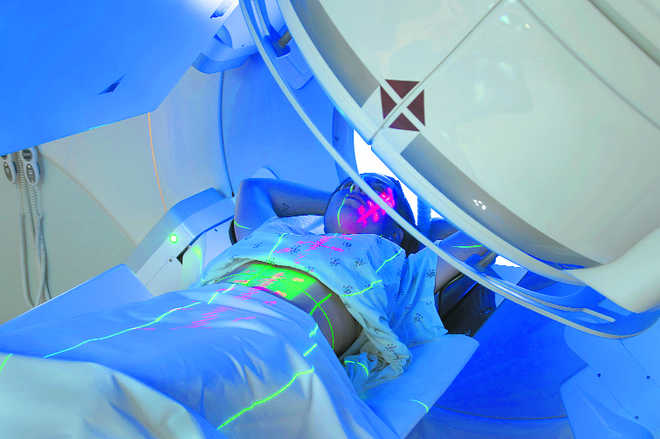
Dr Kanika Sharma
As the incidence of cancer cases increases, there is a proportionate need for awareness about various kinds of therapies and treatments and their various side effects.
In the era of targeted therapies and advanced technologies, it is unfortunate that some people miss out on their chances of getting cured from cancer due to their fears about the side effects of the treatment. One of the major therapies that is helpful in treating various types of cancers is radiation therapy (RT). There are many myths regarding the ill effects of this therapy. Some of these notions were true till a decade back. However, radiation oncologists today are equipped with an armamentarium of technology and advances that successfully curtail many of the side effects and improve quality of life of a cancer patient.
Some of the common myths include:
Myth: It is painful.
Fact: It is actually a painless treatment. A person is who undergoing radiation therapy does not feel any pain, warmth or heat when the treatment is being given. However, during the course of treatment a patient may experience side effects like skin redness, ulcers in throat/mouth depending on the site as a consequence of RT (which might lead to pain). But these can be treated through medications and other measures. The intensity of these side effects can be reduced by using modern radiation techniques leading to skin sparing.
Myth: Radiation can be passed from person to person.
Fact: Any person receiving external beam radiation or brachytherapy (internal radiation) does not become radioactive any time during the treatment. There is no lingering radiation and it’s absorbed by body tissues. It’s absolutely safe to stay with family and friends while you are on RT.
Myth: RT causes nausea/vomiting.
Fact: Radiation per se does not cause nausea/vomiting except when directed to specific sites like abdominal area or head region. The nausea can be controlled of by simple medications.
Myth: Radiation causes memory loss.
Fact: Unless the cranial area is being irradiated, radiation treatment would not make you forgetful. Also with the advent of new radiation techniques, hippocampal sparing (part of the brain responsible for memory) is now an option to prevent memory loss in patients receiving radiation for brain tumors.
Myth: Is radiation therapy safe?
Fact: Radiation therapy has been successfully used to treat patients for more than 100 years. There are stochastic and deterministic effects of radiation but the risk of ‘radiation-induced secondary cancers’ is only one in 1000 to 10,000. Newer techniques like volumetric arc therapy (VMAT) have drastically reduced target volumes of area to be treated which reduces the doses of radiation to normal adjacent tissues around the tumour. Radiation therapy is vital for local control and prevent disease recurrence.
Myth: Radiation affects fertility.
Fact: Modern radiotherapy is localised and only affects the part being treated. It is usually ensured that the radiation dose received by gonads is minimal. If there is an anticipated high dose of radiation in vicinity of gonads then ova/sperm preservation is usually advised beforehand. At times, ovaries are surgically shifted to an area where radiation will not be delivered.
Modern medical science and techniques have always worked for better control of cancer and to reduce its side effects. A holistic approach is followed where attention is being paid to the cosmetic and functional outcomes as well. To ensure a good outcome, it is essential to get timely treatment.
Myth: RT causes hair loss from head/scalp.
Fact: Radiation would cause local area hair loss which is temporary and reversible. Only patients receiving RT to the head region would lose their scalp hair in a patches. But nowadays with newer techniques like ‘scalp sparing IMRT’, it is possible to prevent this. Also, radiation received on any other body part will not cause scalp hair loss. Male patients with RT might lose facial/beard/moustache hair. That, anyhow, is recommended to be shaved/trimmed before treatment to avoid side effects on skin.
Myth: Radiation leads to skin burns.
Fact: RT does not cause skin burning but it does lead to redness, darkening and peeling of skin in the local area being treated. The magnitude of these side effects varies from person to person and also depends on area being treated. These effects are usually temporary and gradually improve after the completion of RT.
— The writer is senior consultant, radiation oncology, Dharamshila Narayana Superspeciality Hospital, New Delhi



























